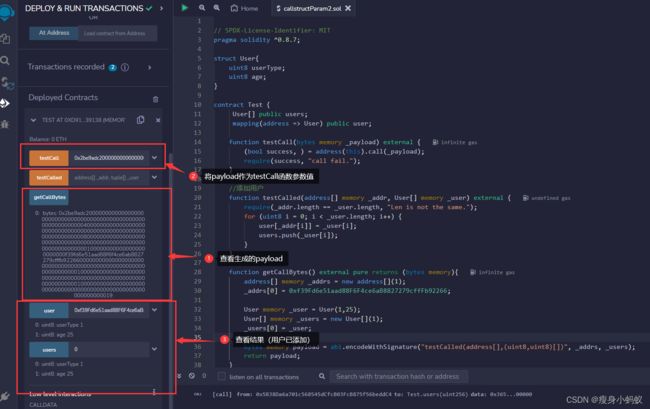- 《Solidity智能合约开发:从零到一实战指南》大纲
白马区块Crypto100
智能合约
为什么要学Solidity智能合约?在过去几年,区块链从一种“投机工具”进化为一种全新的技术基础设施。无论是NFT、DeFi、GameFi还是DAO,它们的核心都是——智能合约。✨什么是智能合约?智能合约是运行在区块链上的“自动执行程序”,不用依赖中介或第三方,信任直接写进代码里。而Solidity是智能合约开发的“通用语言”。为什么要做这个专栏?做区块链项目的人越来越多,但真正从零系统学习Sol
- 【区块链】跨链技术详解
还没入门的大菜狗
区块链
跨链技术详解:打通区块链孤岛一、跨链技术概述1.定义与必要性跨链技术是指实现不同区块链网络之间价值和信息互操作的解决方案。随着区块链生态系统的扩张,解决"区块链孤岛"问题变得至关重要。跨链技术解决的核心问题:不同区块链间的资产流动跨链数据和状态共享多链智能合约调用统一的用户体验2.跨链技术的基本挑战一致性保障:确保跨链交易的原子性验证复杂性:如何在一条链上验证另一条链的状态安全保证:防止双花攻击和
- 使用Truffle进行智能合约测试
25号底片t
智能合约区块链网络
1、Vscode下安装Solidity插件,change到指定的solidity编译器的版本下2、Truffle开发框架的安装:npminstall-gtruffle3、在workspace下新建一个truffle-test的项目目录,执行truffleinit初始化项目D:\WorkSpace\4、在migrations目录下新建一个js文件:1_deploy_contracts.js(注意文件
- 【自学笔记】Web3基础知识点总览-持续更新
Long_poem
笔记web3
提示:文章写完后,目录可以自动生成,如何生成可参考右边的帮助文档文章目录Web3基础知识点总览(Markdown格式)1.引言2.区块链基础3.智能合约4.去中心化应用(DApps)5.数字货币与钱包6.跨链技术7.Web3生态与工具代码块示例(Solidity智能合约)总结Web3基础知识点总览(Markdown格式)1.引言Web3,也称为第三代互联网或去中心化互联网,旨在通过区块链技术实现更
- 解锁区块链智能合约的未来:构建支持仿真测试的MySQL环境
墨夶
数据库学习资料1区块链智能合约mysql
在区块链技术快速发展的今天,智能合约作为其核心组件之一,正在改变我们处理交易、管理资产乃至构建商业逻辑的方式。然而,对于许多开发者而言,在正式部署之前如何有效地测试和验证智能合约的行为仍然是一个不小的挑战。本文将详细介绍如何设计并实现一个基于MySQL的支持智能合约仿真执行的环境,使您能够在传统的关系型数据库中体验到智能合约的强大功能。一、为什么选择MySQL?尽管以太坊等平台提供了专门用于编写和
- 解锁区块链智能合约版本管理的新纪元——MySQL架构下的革新之道
墨夶
数据库学习资料1区块链智能合约mysql
在区块链技术蓬勃发展的今天,智能合约作为去中心化应用(DApps)的核心组件,其版本管理和升级机制的重要性日益凸显。然而,传统的智能合约一旦部署便难以更改的特性给开发者带来了不小的挑战。面对这一难题,如何构建一个既能够保障数据安全又便于维护和更新的智能合约管理系统成为了业界关注的焦点。本文将深入探讨基于MySQL数据库设计支持智能合约版本控制的解决方案,旨在为读者提供一套完整的、易于实施的技术框架
- 《颠覆传统,用Web3.0技术手撸一个去中心化微博(含完整代码)》
煜bart
web3人工智能区块链
一、为什么你的下一个项目必须拥抱Web3.0?传统互联网正面临三大致命伤:-用户数据被巨头垄断(某浪删帖事件频发)-单点故障导致服务瘫痪(某云宕机损失过亿)-创作者收益被平台榨取(某音抽成高达70%)**Web3.0的破局方案:**-✅数据永久存储在IPFS/Arweave-✅智能合约自动分配收益-✅抗审查的链上内容存证---###二、核心技术栈揭秘(附对比图表)|技术|传统方案|Web3.0方案
- Python:区块链 Blockchain 入门的技术指南
拾荒的小海螺
Pythonpython区块链开发语言
1、简述区块链(Blockchain)是一种去中心化、不可篡改的分布式账本技术,最初因比特币而广为人知。如今,区块链已发展成为一种可以应用于金融、供应链管理、智能合约等多个领域的技术。本文将简要介绍区块链的基本概念和原理,并通过Python实现一个简化的区块链原型,帮助您快速上手区块链的实践。2、基本原理区块链是一种链式结构,由多个“区块”串联而成。每个区块中包含若干交易信息,并通过加密哈希指向前
- 区块链赋能:用Python开发去中心化投票系统
Echo_Wish
Python!实战!区块链python去中心化
区块链赋能:用Python开发去中心化投票系统在这个互联网迅猛发展的时代,投票系统不仅仅停留在政务领域,它已成为社区治理、企业决策甚至区块链DAO(去中心化自治组织)中重要的机制。然而,传统投票系统往往集中化,存在信任和数据安全问题。区块链技术以其不可篡改性和透明性为去中心化投票提供了理想的解决方案。在这篇文章中,我将通过Python语言,结合区块链智能合约,教你如何从零开发一个去中心化的投票系统
- ERC-6909 最小多代币标准
GTokenTool发币平台
区块链
ERC-6909Token标准是ERC-1155Token标准的一种简化替代方案。ERC-1155标准引入了一种多Token接口,使得单个智能合约能够结合可替代的和不可替代的Token(即,ERC20和ERC721)。ERC-1155解决了多个挑战,例如降低部署成本、最小化以太坊区块链上的冗余字节码,以及简化多Token交易的Token批准流程。然而,由于每次转账都强制要求回调、强制包含批量转账,
- Web3身份验证技术对数据保护的影响研究
清 晨
反侦测指纹浏览器社交媒体web3ClonBrowser跨境电商隐私保护
Web3身份验证技术对数据保护的影响研究在这个数字化时代,我们的身份和数据安全比以往任何时候都更加重要。Web3技术以其去中心化和用户主权的核心理念,为个人数据的管理和保护提供了新的视角。本文将探讨Web3身份验证技术如何影响数据保护,并分析其对我们数字生活的影响。Web3身份验证技术简介Web3身份验证技术依托于区块链和先进的加密技术,如非对称加密算法和智能合约,为用户提供了一种全新的身份验证方
- 扫盲系列--Web3智能合约+Solidity简介
「已注销」
前端框架
前言这几天web3智能合约这个概念,频繁映入我的眼帘。web3.0这个概念我听说过,核心特征是去中心化、开放性、隐私保护和数据所有权回归个人。Web1.0是信息浏览时代,Web2.0是用户参与和社交网络时代,Web3.0是去中心化与智能化时代。在Web3.0这一新的互联网架构下,用户不再仅仅是内容的消费者,更是自己数字身份和数据的拥有者。Web3.0旨在构建一个更加透明、安全且高效的信息网络。我对
- 链上赋能:智能合约重塑供应链管理
Echo_Wish
前沿技术人工智能智能合约linux运维
链上赋能:智能合约重塑供应链管理供应链是现代经济活动的核心,而复杂的供应链环节常常面临诸多挑战:数据孤岛、信息不透明、操作低效甚至信任危机。这些问题不仅增加了运营成本,还导致资源浪费。随着区块链技术的兴起,供应链管理迎来了新的解决方案,其中智能合约(SmartContract)作为区块链的重要组成部分,正在颠覆传统的供应链管理模式。在本文中,我将结合Python开发与智能合约,探讨智能合约在供应链
- Go语言的智能合约
崔婉凝
包罗万象golang开发语言后端
Go语言与智能合约的结合随着区块链技术的快速发展,智能合约作为其重要组成部分,正在逐渐改变传统行业的运作方式。作为区块链上的一种自执行程序,智能合约的出现为信任机制的构建提供了新的解决方案。在众多开发语言中,Go语言因其高效性、并发性和良好的可维护性,越来越受到智能合约开发者的青睐。本文将深入探讨Go语言在智能合约开发中的优势、应用以及实现方法。1.智能合约概述智能合约是一种自动执行、控制或文档的
- Golang学习笔记_49——解释器模式
LuckyLay
Golang学习笔记golang学习笔记解释器模式设计模式
Golang学习笔记_46——状态模式Golang学习笔记_47——访问者模式Golang学习笔记_48——中介者模式文章目录一、核心概念1.定义2.解决的问题3.核心角色4.类图二、特点分析三、适用场景1.金融公式引擎2.智能合约解析3.业务规则引擎四、Go语言实现示例完整实现代码执行结果五、高级应用1.表达式缓存优化2.并行解释器六、与其他模式对比七、实现建议八、典型应用一、核心概念1.定义解
- 区块链与去中心化技术
boring_student
区块链去中心化
区块链与去中心化技术核心进展区块链从加密货币(如比特币)扩展至智能合约和供应链管理。以太坊2.0引入分片技术提升交易吞吐量,而零知识证明(ZKP)增强了隐私保护15。企业级应用如IBM的FoodTrust平台通过区块链追踪农产品全生命周期,减少供应链欺诈1。应用场景数字身份:去中心化身份(DID)系统允许用户自主管理个人数据5。版权保护:NFT技术为数字艺术品提供唯一所有权证明9。跨境支付:Rip
- 学习Web3.0需要具备哪些基础知识?
alankuo
人工智能人工智能
学习Web3.0需要具备以下基础知识:一、计算机科学基础1.编程知识-了解至少一种编程语言,如Python、JavaScript等。这将有助于理解Web3.0应用程序的开发和智能合约的编写。-熟悉编程概念,如变量、数据类型、控制结构、函数等。2.数据结构和算法-掌握常见的数据结构,如数组、链表、栈、队列、树、图等,以及它们的操作和应用。-了解基本的算法,如排序、搜索、递归等,以及它们的时间和空间复
- HarmonyNext实战:基于ArkTS的高性能区块链应用开发
harmonyos-next
HarmonyNext实战:基于ArkTS的高性能区块链应用开发引言区块链技术作为一种去中心化、安全可信的分布式账本技术,正在各个领域得到广泛应用。本文将深入探讨如何利用ArkTS语言在HarmonyNext平台上开发一个高性能的区块链应用,涵盖从区块链基础概念到智能合约开发的完整流程。我们将通过一个实际的案例——去中心化投票系统,来展示如何在HarmonyNext上实现区块链技术的落地应用。1.
- solidity高阶 -- Eth支付
第十六年盛夏.
Solidity智能合约区块链智能合约
在区块链的世界里,智能合约是实现去中心化应用(DApp)的核心技术之一。Solidity是一种专门用于编写以太坊智能合约的编程语言,它可以帮助开发者构建各种功能,包括支付功能。今天,我们就来探讨如何使用Solidity实现以太坊主币的支付功能,以及如何通过智能合约接收和管理这些资金。注意:使用继承时请确保代码的正确性,以防丢失个人财产,在这里友情提示您,不要复制来源不明的solidity代码并进行
- Solana合约的错误处理
GTokenTool发币平台
区块链
错误处理Solana合约开发中错误处理是一个重要的部分,它帮助开发者和用户理解合约执行过程中发生的问题。Solana使用Rust编程语言开发智能合约(称为程序),并提供了一套丰富的错误处理机制,其中包括定义和使用错误类型。在合约开发中,我们需要返回ProgramResult类型,其定义为:rustuse{std::{result::ResultasResultGeneric,},};pubtype
- HarmonyNext实战:基于ArkTS的跨平台区块链应用开发
harmonyos-next
HarmonyNext实战:基于ArkTS的跨平台区块链应用开发引言区块链技术作为一种去中心化的分布式账本技术,近年来在金融、供应链、物联网等领域得到了广泛应用。本文将深入探讨如何使用ArkTS在HarmonyNext平台上构建一个跨平台的区块链应用,涵盖从区块链网络搭建、智能合约开发、交易处理到数据查询的完整开发流程。我们将通过一个实际的案例——实现一个去中心化的投票系统,来展示ArkTS在Ha
- io.net 是什么,DePIN(去中心化物理基础设施网络)
ZhangJiQun&MXP
2021AIpython教学2021数字交易数字资产区块链io.net
目录io.net是什么io.net去中心化原理DePIN(去中心化物理基础设施网络)1.资源整合与去中心化2.区块链技术与智能合约3.弹性伸缩与负载均衡4.安全性与隐私保护5.用户体验与易用性io.net是什么io.net是一个基于Solana网络的去中心化GPU分配基础设施。以下是关于io.net的详细介绍:项目简介:io.net成立于2023年二月,是一个在Solana网络上构建的分布式GPU
- Web3 DApp 测试指南
m0_51192916
web3DApp
Web3DApp测试个人总结Web3DApp(去中心化应用)前端开发与传统Web2应用存在显著不同。由于DApp依赖智能合约、区块链RPC交互、钱包签名等技术,其测试方式也有别于传统前端测试。本指南系统介绍Web3DApp前端的测试方法,包括功能测试、兼容性测试、安全测试、性能测试,让你快速上手Web3DApp测试。1.Web3DApp基础知识1.1什么是Web3DApp?Web3DApp(Dec
- 6-5,web3浏览器链接区块链(react+区块链实战)
吾名招财
区块链web3区块链react.js
6-5,web3浏览器链接区块链(react+区块链实战)6-5web3浏览器链接区块链(调用读写合约与metamask联动)6-5web3浏览器链接区块链(调用读写合约与metamask联动)这里就是浏览器端和智能合约的交互两个库Web3Trufflecontract//truffle在链接前端合约简单包了一层,比较好用来到react项目的根目录下(在第一章进行了创建),这里重新创建一个reac
- 探索DeFi世界:用Python开发去中心化金融应用
Echo_Wish
Python!实战!python去中心化金融
探索DeFi世界:用Python开发去中心化金融应用在区块链技术快速发展的今天,去中心化金融(DeFi)正在改变传统金融行业的格局。作为一名自媒体创作者和技术爱好者,我希望通过本文分享如何用Python开发去中心化金融应用,帮助读者深入了解DeFi的潜力和技术实现方式。什么是去中心化金融(DeFi)?去中心化金融,即DeFi,是指利用区块链技术和智能合约构建的金融服务系统。与传统金融体系不同,De
- DApp开发中的模式设计、功能文档与代币对接解析
飞机号dapp119
区块链开发区块链游戏去中心化智能合约
随着区块链技术的快速发展,去中心化应用(DApp)凭借其透明性、安全性和去中心化特性,正重塑数字世界的交互方式。DApp通过智能合约实现业务逻辑自动化,结合区块链的分布式账本技术,为金融、游戏、供应链等领域提供了可信的解决方案。一、DApp开发模式类型设计DApp的设计模式直接影响其性能、安全性与用户体验,需结合业务场景与区块链底层特性进行规划。以下为四大核心模式类型:交易模式点对点交易模式:用户
- 区块链交易所开发:痛点与解决方案深度剖析
运维web3区块链智能合约
一、引言区块链技术的发展为全球金融市场带来了新的机遇与挑战。在区块链交易所开发领域,众多痛点制约着其发展。了解这些痛点并探索有效的解决方法,不仅对开发者至关重要,也为广大用户带来了新的期待。二、痛点分析技术层面底层技术选择困难:区块链技术不断发展,多种区块链平台各有优劣。比特币区块链以其高度安全和稳定著称,以太坊则在智能合约方面表现出色。开发者在选择底层技术时,需考虑技术成熟度、性能、可扩展性等因
- AI 代理 x Sui:开启 Web3 自动化新时代!
Sui_Network
人工智能web3自动化游戏大数据
AI代理正在重塑Web3,它们通过更高的自动化、智能化和适应性,使去中心化应用(DApp)更高效。这些自主程序能够分析数据、与智能合约交互,并实时执行任务,从而提升资产管理效率、增强安全性,并提供更动态的用户体验和交互方式。随着Web3的不断发展,AI代理正成为链上流程优化的重要工具,并不断拓展Web3的可能性。从自动化DeFi策略、实时安全监测,到数据分析洞察,甚至是meme生成,AI代理的应用
- 一文了解以太坊的MethodID
住在河边的程序猿
区块链教程区块链MethodIDethers以太坊
一、什么是MethodID?以太坊依靠一个唯一标识符(称为MethodID或函数选择器functionselector)来区分智能合约中的不同函数或方法。MethodID是函数签名的Keccak-256哈希的前4个字节(8个字符,包括0x也就是取前10个字符),用于指定要调用哪些函数。函数签名包括函数名称及其参数类型,它们之间用逗号分隔,中间没有空格。接下来以transfer函数为例,进行说明:c
- 探索智能合约开发的宝藏钥匙:Brownie教程项目
潘俭渝Erik
探索智能合约开发的宝藏钥匙:Brownie教程项目去发现同类优质开源项目:https://gitcode.com/随着区块链技术的迅速崛起,智能合约成为了构建去中心化应用的基石。对于渴望深入这一领域的开发者而言,BrownieTutorial正是打开这扇神秘大门的金钥匙。本项目由Curve团队精心打造,通过一系列详尽的教学视频与配套代码仓库,引领您从零起步,直至成为智能合约领域的行家里手。项目介绍
- web报表工具FineReport常见的数据集报错错误代码和解释
老A不折腾
web报表finereport代码可视化工具
在使用finereport制作报表,若预览发生错误,很多朋友便手忙脚乱不知所措了,其实没什么,只要看懂报错代码和含义,可以很快的排除错误,这里我就分享一下finereport的数据集报错错误代码和解释,如果有说的不准确的地方,也请各位小伙伴纠正一下。
NS-war-remote=错误代码\:1117 压缩部署不支持远程设计
NS_LayerReport_MultiDs=错误代码
- Java的WeakReference与WeakHashMap
bylijinnan
java弱引用
首先看看 WeakReference
wiki 上 Weak reference 的一个例子:
public class ReferenceTest {
public static void main(String[] args) throws InterruptedException {
WeakReference r = new Wea
- Linux——(hostname)主机名与ip的映射
eksliang
linuxhostname
一、 什么是主机名
无论在局域网还是INTERNET上,每台主机都有一个IP地址,是为了区分此台主机和彼台主机,也就是说IP地址就是主机的门牌号。但IP地址不方便记忆,所以又有了域名。域名只是在公网(INtERNET)中存在,每个域名都对应一个IP地址,但一个IP地址可有对应多个域名。域名类型 linuxsir.org 这样的;
主机名是用于什么的呢?
答:在一个局域网中,每台机器都有一个主
- oracle 常用技巧
18289753290
oracle常用技巧 ①复制表结构和数据 create table temp_clientloginUser as select distinct userid from tbusrtloginlog ②仅复制数据 如果表结构一样 insert into mytable select * &nb
- 使用c3p0数据库连接池时出现com.mchange.v2.resourcepool.TimeoutException
酷的飞上天空
exception
有一个线上环境使用的是c3p0数据库,为外部提供接口服务。最近访问压力增大后台tomcat的日志里面频繁出现
com.mchange.v2.resourcepool.TimeoutException: A client timed out while waiting to acquire a resource from com.mchange.v2.resourcepool.BasicResou
- IT系统分析师如何学习大数据
蓝儿唯美
大数据
我是一名从事大数据项目的IT系统分析师。在深入这个项目前需要了解些什么呢?学习大数据的最佳方法就是先从了解信息系统是如何工作着手,尤其是数据库和基础设施。同样在开始前还需要了解大数据工具,如Cloudera、Hadoop、Spark、Hive、Pig、Flume、Sqoop与Mesos。系 统分析师需要明白如何组织、管理和保护数据。在市面上有几十款数据管理产品可以用于管理数据。你的大数据数据库可能
- spring学习——简介
a-john
spring
Spring是一个开源框架,是为了解决企业应用开发的复杂性而创建的。Spring使用基本的JavaBean来完成以前只能由EJB完成的事情。然而Spring的用途不仅限于服务器端的开发,从简单性,可测试性和松耦合的角度而言,任何Java应用都可以从Spring中受益。其主要特征是依赖注入、AOP、持久化、事务、SpringMVC以及Acegi Security
为了降低Java开发的复杂性,
- 自定义颜色的xml文件
aijuans
xml
<?xml version="1.0" encoding="utf-8"?> <resources> <color name="white">#FFFFFF</color> <color name="black">#000000</color> &
- 运营到底是做什么的?
aoyouzi
运营到底是做什么的?
文章来源:夏叔叔(微信号:woshixiashushu),欢迎大家关注!很久没有动笔写点东西,近些日子,由于爱狗团产品上线,不断面试,经常会被问道一个问题。问:爱狗团的运营主要做什么?答:带着用户一起嗨。为什么是带着用户玩起来呢?究竟什么是运营?运营到底是做什么的?那么,我们先来回答一个更简单的问题——互联网公司对运营考核什么?以爱狗团为例,绝大部分的移动互联网公司,对运营部门的考核分为三块——用
- js面向对象类和对象
百合不是茶
js面向对象函数创建类和对象
接触js已经有几个月了,但是对js的面向对象的一些概念根本就是模糊的,js是一种面向对象的语言 但又不像java一样有class,js不是严格的面向对象语言 ,js在java web开发的地位和java不相上下 ,其中web的数据的反馈现在主流的使用json,json的语法和js的类和属性的创建相似
下面介绍一些js的类和对象的创建的技术
一:类和对
- web.xml之资源管理对象配置 resource-env-ref
bijian1013
javaweb.xmlservlet
resource-env-ref元素来指定对管理对象的servlet引用的声明,该对象与servlet环境中的资源相关联
<resource-env-ref>
<resource-env-ref-name>资源名</resource-env-ref-name>
<resource-env-ref-type>查找资源时返回的资源类
- Create a composite component with a custom namespace
sunjing
https://weblogs.java.net/blog/mriem/archive/2013/11/22/jsf-tip-45-create-composite-component-custom-namespace
When you developed a composite component the namespace you would be seeing would
- 【MongoDB学习笔记十二】Mongo副本集服务器角色之Arbiter
bit1129
mongodb
一、复本集为什么要加入Arbiter这个角色 回答这个问题,要从复本集的存活条件和Aribter服务器的特性两方面来说。 什么是Artiber? An arbiter does
not have a copy of data set and
cannot become a primary. Replica sets may have arbiters to add a
- Javascript开发笔记
白糖_
JavaScript
获取iframe内的元素
通常我们使用window.frames["frameId"].document.getElementById("divId").innerHTML这样的形式来获取iframe内的元素,这种写法在IE、safari、chrome下都是通过的,唯独在fireforx下不通过。其实jquery的contents方法提供了对if
- Web浏览器Chrome打开一段时间后,运行alert无效
bozch
Webchormealert无效
今天在开发的时候,突然间发现alert在chrome浏览器就没法弹出了,很是怪异。
试了试其他浏览器,发现都是没有问题的。
开始想以为是chorme浏览器有啥机制导致的,就开始尝试各种代码让alert出来。尝试结果是仍然没有显示出来。
这样开发的结果,如果客户在使用的时候没有提示,那会带来致命的体验。哎,没啥办法了 就关闭浏览器重启。
结果就好了,这也太怪异了。难道是cho
- 编程之美-高效地安排会议 图着色问题 贪心算法
bylijinnan
编程之美
import java.util.ArrayList;
import java.util.Collections;
import java.util.List;
import java.util.Random;
public class GraphColoringProblem {
/**编程之美 高效地安排会议 图着色问题 贪心算法
* 假设要用很多个教室对一组
- 机器学习相关概念和开发工具
chenbowen00
算法matlab机器学习
基本概念:
机器学习(Machine Learning, ML)是一门多领域交叉学科,涉及概率论、统计学、逼近论、凸分析、算法复杂度理论等多门学科。专门研究计算机怎样模拟或实现人类的学习行为,以获取新的知识或技能,重新组织已有的知识结构使之不断改善自身的性能。
它是人工智能的核心,是使计算机具有智能的根本途径,其应用遍及人工智能的各个领域,它主要使用归纳、综合而不是演绎。
开发工具
M
- [宇宙经济学]关于在太空建立永久定居点的可能性
comsci
经济
大家都知道,地球上的房地产都比较昂贵,而且土地证经常会因为新的政府的意志而变幻文本格式........
所以,在地球议会尚不具有在太空行使法律和权力的力量之前,我们外太阳系统的友好联盟可以考虑在地月系的某些引力平衡点上面,修建规模较大的定居点
- oracle 11g database control 证书错误
daizj
oracle证书错误oracle 11G 安装
oracle 11g database control 证书错误
win7 安装完oracle11后打开 Database control 后,会打开em管理页面,提示证书错误,点“继续浏览此网站”,还是会继续停留在证书错误页面
解决办法:
是 KB2661254 这个更新补丁引起的,它限制了 RSA 密钥位长度少于 1024 位的证书的使用。具体可以看微软官方公告:
- Java I/O之用FilenameFilter实现根据文件扩展名删除文件
游其是你
FilenameFilter
在Java中,你可以通过实现FilenameFilter类并重写accept(File dir, String name) 方法实现文件过滤功能。
在这个例子中,我们向你展示在“c:\\folder”路径下列出所有“.txt”格式的文件并删除。 1 2 3 4 5 6 7 8 9 10 11 12 13 14 15 16
- C语言数组的简单以及一维数组的简单排序算法示例,二维数组简单示例
dcj3sjt126com
carray
# include <stdio.h>
int main(void)
{
int a[5] = {1, 2, 3, 4, 5};
//a 是数组的名字 5是表示数组元素的个数,并且这五个元素分别用a[0], a[1]...a[4]
int i;
for (i=0; i<5; ++i)
printf("%d\n",
- PRIMARY, INDEX, UNIQUE 这3种是一类 PRIMARY 主键。 就是 唯一 且 不能为空。 INDEX 索引,普通的 UNIQUE 唯一索引
dcj3sjt126com
primary
PRIMARY, INDEX, UNIQUE 这3种是一类PRIMARY 主键。 就是 唯一 且 不能为空。INDEX 索引,普通的UNIQUE 唯一索引。 不允许有重复。FULLTEXT 是全文索引,用于在一篇文章中,检索文本信息的。举个例子来说,比如你在为某商场做一个会员卡的系统。这个系统有一个会员表有下列字段:会员编号 INT会员姓名
- java集合辅助类 Collections、Arrays
shuizhaosi888
CollectionsArraysHashCode
Arrays、Collections
1 )数组集合之间转换
public static <T> List<T> asList(T... a) {
return new ArrayList<>(a);
}
a)Arrays.asL
- Spring Security(10)——退出登录logout
234390216
logoutSpring Security退出登录logout-urlLogoutFilter
要实现退出登录的功能我们需要在http元素下定义logout元素,这样Spring Security将自动为我们添加用于处理退出登录的过滤器LogoutFilter到FilterChain。当我们指定了http元素的auto-config属性为true时logout定义是会自动配置的,此时我们默认退出登录的URL为“/j_spring_secu
- 透过源码学前端 之 Backbone 三 Model
逐行分析JS源代码
backbone源码分析js学习
Backbone 分析第三部分 Model
概述: Model 提供了数据存储,将数据以JSON的形式保存在 Model的 attributes里,
但重点功能在于其提供了一套功能强大,使用简单的存、取、删、改数据方法,并在不同的操作里加了相应的监听事件,
如每次修改添加里都会触发 change,这在据模型变动来修改视图时很常用,并且与collection建立了关联。
- SpringMVC源码总结(七)mvc:annotation-driven中的HttpMessageConverter
乒乓狂魔
springMVC
这一篇文章主要介绍下HttpMessageConverter整个注册过程包含自定义的HttpMessageConverter,然后对一些HttpMessageConverter进行具体介绍。
HttpMessageConverter接口介绍:
public interface HttpMessageConverter<T> {
/**
* Indicate
- 分布式基础知识和算法理论
bluky999
算法zookeeper分布式一致性哈希paxos
分布式基础知识和算法理论
BY
[email protected]
本文永久链接:http://nodex.iteye.com/blog/2103218
在大数据的背景下,不管是做存储,做搜索,做数据分析,或者做产品或服务本身,面向互联网和移动互联网用户,已经不可避免地要面对分布式环境。笔者在此收录一些分布式相关的基础知识和算法理论介绍,在完善自我知识体系的同
- Android Studio的.gitignore以及gitignore无效的解决
bell0901
androidgitignore
github上.gitignore模板合集,里面有各种.gitignore : https://github.com/github/gitignore
自己用的Android Studio下项目的.gitignore文件,对github上的android.gitignore添加了
# OSX files //mac os下 .DS_Store
- 成为高级程序员的10个步骤
tomcat_oracle
编程
What
软件工程师的职业生涯要历经以下几个阶段:初级、中级,最后才是高级。这篇文章主要是讲如何通过 10 个步骤助你成为一名高级软件工程师。
Why
得到更多的报酬!因为你的薪水会随着你水平的提高而增加
提升你的职业生涯。成为了高级软件工程师之后,就可以朝着架构师、团队负责人、CTO 等职位前进
历经更大的挑战。随着你的成长,各种影响力也会提高。
- mongdb在linux下的安装
xtuhcy
mongodblinux
一、查询linux版本号:
lsb_release -a
LSB Version: :base-4.0-amd64:base-4.0-noarch:core-4.0-amd64:core-4.0-noarch:graphics-4.0-amd64:graphics-4.0-noarch:printing-4.0-amd64:printing-4.0-noa

